
Journal Menu
► ▼ Journal Menu-
- Actuators Home
- Aims & Scope
- Editorial Board
- Reviewer Board
- Topical Advisory Panel
- Instructions for Authors
- Special Issues
- Topics
- Sections
- Article Processing Charge
- Indexing & Archiving
- Editor’s Choice Articles
- Most Cited & Viewed
- Journal Statistics
- Journal History
- Journal Awards
- Conferences
- Editorial Office
Journal Browser
► ▼ Journal BrowserNeed Help?
Announcements
31 May 2024
Meet Us at the 2024 American Control Conference, 8–12 July 2024, Toronto, Canada

MDPI will be attending the 2024 American Control Conference in Toronto, Canada, which will take place from 8 to 12 July 2024. The American Control Conference (AAC) is the annual conference of the American Automatic Control Council (AACC), the U.S. national member organization of the International Federation for Automatic Control (IFAC). ACC 2024 is committed to being not only the premier venue for the dissemination of work in automatic control and systems theory but also providing an environment that is inclusive of and supportive to all members.
The following MDPI journals will be represented at the conference:
- Applied Sciences;
- Electronics;
- Actuators;
- Applied System Innovation;
- Automation;
- Drones;
- Eng;
- Inventions;
- Machines;
- Modelling;
- Processes;
- Robotics;
- Technologies;
- Telecom.
If you are planning to attend the above conference, please visit our booth. Our delegates look forward to meeting you in person and answering any questions that you may have. For more information about the conference, please visit the following website: https://acc2024.a2c2.org/.
23 May 2024
Transfer Service in MDPI
We are pleased to announce MDPI’s Transfer Service.
This service provides a convenient method of transferring your manuscript file, along with any reviewer comments, to another journal within our publishing portfolio.
We are committed to helping authors find the right home for their research, and we will provide authors with guidance and technical support through all stages of the transfer process. Authors will be able to choose to transfer in the following two situations:
1. Select alternative journals on submission.
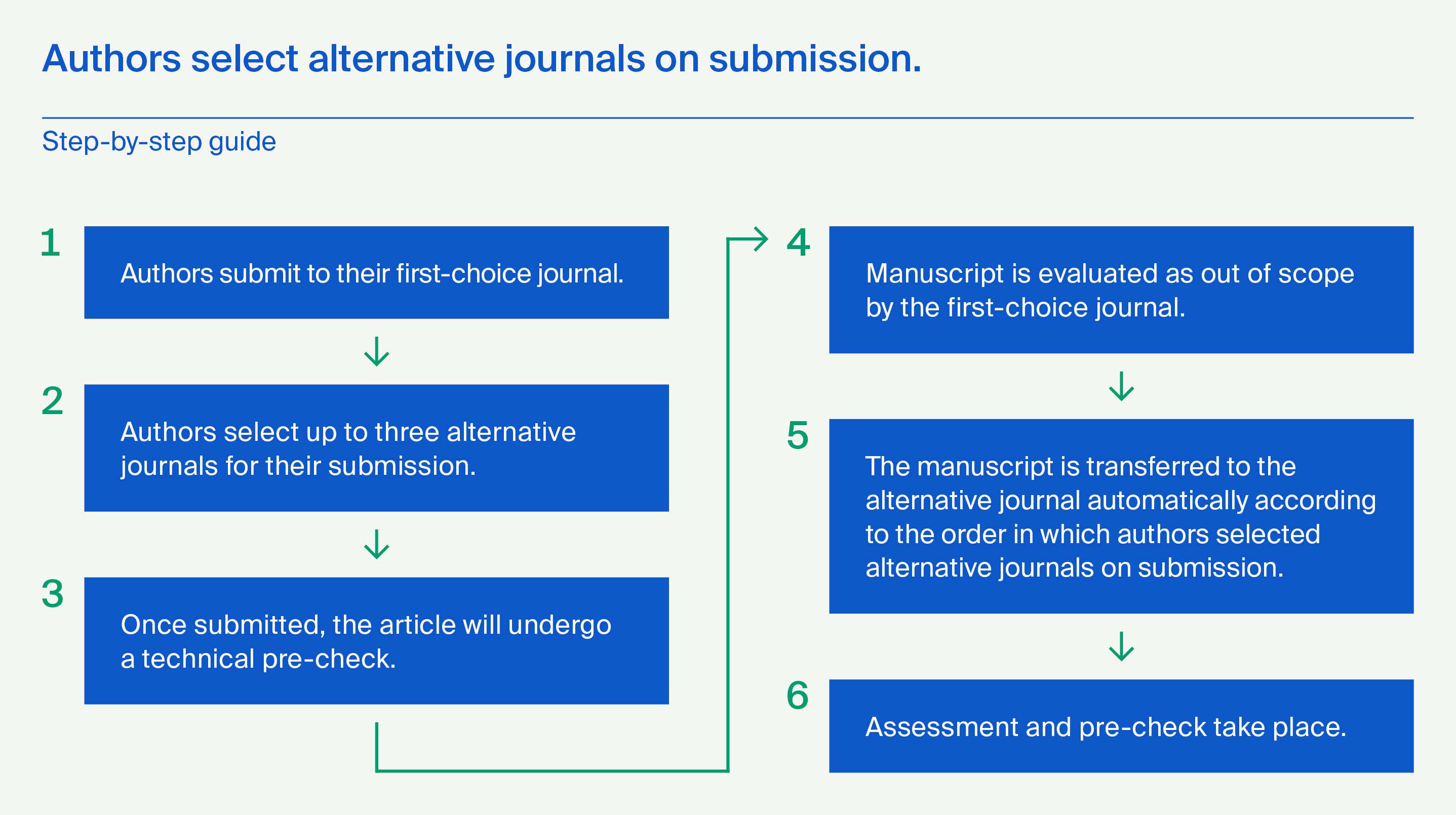
2. Authors are encouraged to transfer manuscripts to other MDPI journals.
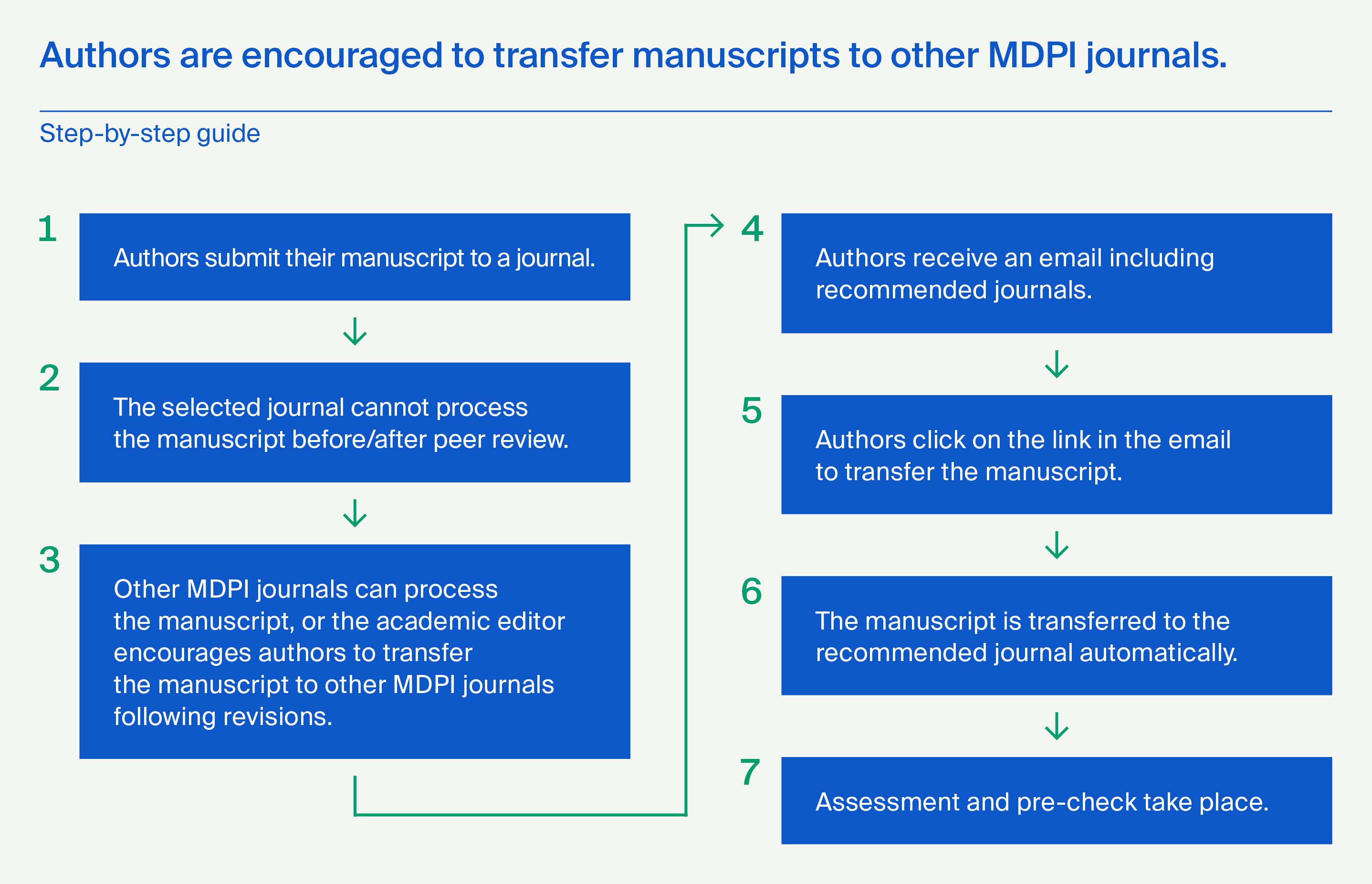
More details about the Transfer Service can be found at the following link:
17 May 2024
Tu Youyou Award—Open for Nominations
In acknowledgment of the groundbreaking achievements of Professor Tu Youyou, the Nobel laureate credited with the discovery of artemisinin, MDPI is proud to announce the Tu Youyou Award. This award, inaugurated in 2016, seeks to honor scholars who excel in the fields of natural products chemistry and medicinal chemistry.
Prize:
- CHF 100,000 in total (If there is more than one winner, the prize will be divided equally amongst the winners);
- An award medal for each winner.
Who should be nominated?
- Scientists with outstanding achievements and contributions in the fields of natural products chemistry and medicinal chemistry.
Who can submit a nomination?
- Academic research institutes
- Universities
- Academic societies
Any personal nominations are not accepted.
How do I submit a nomination?
Candidates’ institutional affiliations need to submit their nominations for final candidates to the Tu Youyou Award Team directly by email after internal screening, and each institution can only nominate a maximum of two candidates for each edition of the Tu Youyou Award. Please note that the nominations cannot be modified once they are submitted and confirmed by the Tu Youyou Award Team.
Required nomination materials:
Nomination Form (Download)
Schedule:
Nomination deadline: 31 December 2024;
Winner announcement: 30 April 2025.
Contact:
Tu Youyou Award Team (tuyouyouaward@mdpi.com)
More information can be found on the Tu Youyou Award official website. For any inquiries, do not hesitate to contact the Tu Youyou Award Team.
16 May 2024
MDPI Romania Author Training Academic Events in April
MDPI Romania sponsored four events over the month of April, contributing author training sessions to each event.
The NutriSciLabs 2024 conference was held at the Carol Davila University of Medicine and Pharmacy on 12 April 2024. Organized by the Association of Students from the Faculty of Pharmacy Studies, the conference aimed to enhance students’ academic writing and research skills, and bolster their confidence in participating in the academic world. Ioana Paunescu, journal relations specialist for MDPI Romania, led the training session. Paunescu first outlined MDPI’s history and core values, then explained academic writing techniques, ethics, and similarity percentages. The presentation covered the entire editorial process, highlighting the amount of attention paid to details throughout manuscript processing. Paunescu also discussed common errors that authors make while writing, and how to avoid such errors.
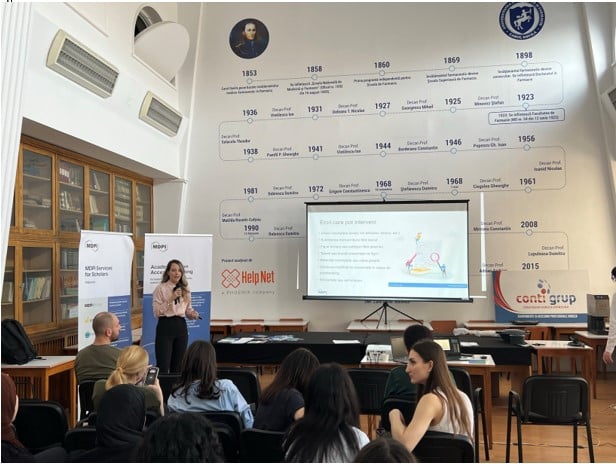
On 13 April 2024, the NextGEN 2.0 Student Conference took place at the Babes-Bolyai University of Cluj-Napoca. NextGen Healthcare organized this event with the university’s European Students’ Society to discuss European and international current affairs. MDPI Romania contributed an author training session called Steps of the Publication Process. Irina Codruta Zaharia, journal relations specialist, began the session with a general introduction of MDPI before diving into different article types, different layout formats, possible journals to submit to, the MDPI submission checklist, and the MDPI editorial process. By explaining the fundamentals of writing and publishing academic papers, Zaharia imparted valuable industry knowledge to the curious minds present. Participants were eager to engage with Zaharia in the subsequent Q&A session.
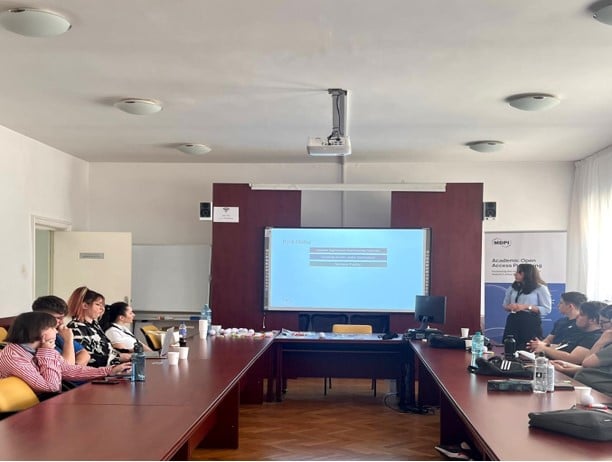
Celebrating its 20th anniversary this year, the International Conference “Students for Students” has long been a gathering place for undergraduate and postgraduate students of all nationalities to present their work and exchange ideas with each other. This year’s conference was held on 18 April 2024, with MDPI Romania contributing an author training session called The World of Open Access. Key speakers included Dr. Norbert Kiss from MDPI Romania and Prof. Dragos Horvath from Strasbourg University. Dr. Kiss discussed the history of open access, differences between open access publishing and traditional publishing, and implications for open access in the future. Attendees expressed keen interest in the subject, approaching Dr. Kiss with questions about academic publishing as well as his career trajectory.
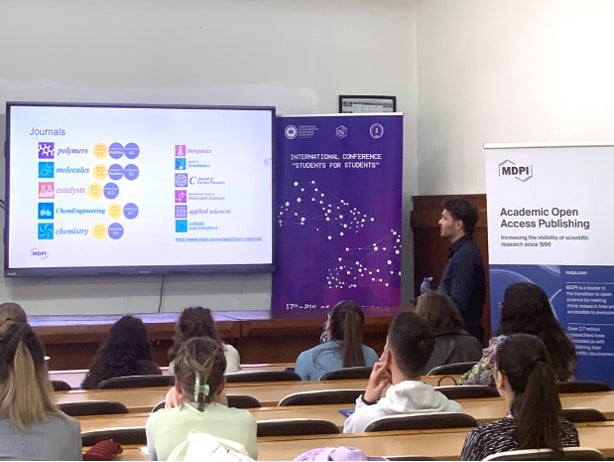
Most recently, on 26 April 2024, MDPI Romania sponsored the National Symposium of Students from Geology and Geophysics Faculties. The AAPG Students Chapter at the Babes-Bolyai University organized this event as an opportunity for geology students from all Romanian universities to present their work and confer with other researchers. Dr. Kiss gave his lecture The World of Open Access at this event as well.
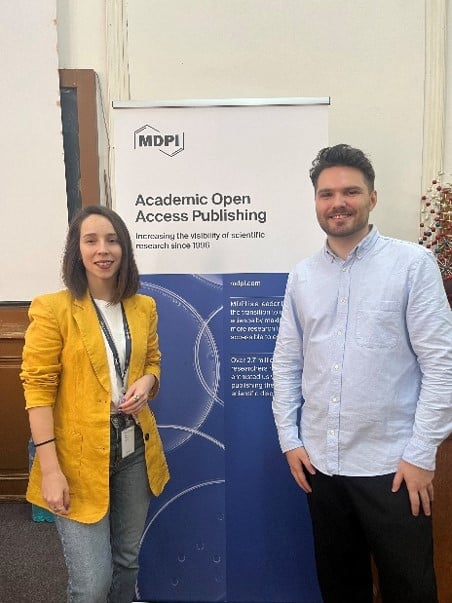
MDPI is thankful to all the participants, speakers, and organizers who attended these events. Through their enthusiasm and dedication, these events were great successes.
2 May 2024
MDPI Insights: The CEO's Letter #11 - 2023 Annual Report, MDPI Awards, STM

Welcome to the MDPI Insights: The CEO's Letter.
In these monthly letters, I will showcase two key aspects of our work at MDPI: our commitment to empowering researchers and our determination to facilitating open scientific exchange.
Opening Thoughts

2023 Annual Report
This is an exciting time of year at MDPI, as we have just released our annual report 2023, recapping the past year and sharing the progress and changes that took place during it.

Stefan Tochev (CEO, MDPI)
Reflecting on 2023, I can't help but think of the changes that have occurred not only at MDPI but also within our industry as a whole. In light of this, I’m reminded that change is the only constant, and that for a publishing enterprise that has experienced rapid growth, adapting to change becomes not only a necessity but also a catalyst for sustained success.
Looking back on the significant ground we covered in 2023, I am pleased to report that the year was marked by a rise in paper submissions, along with a range of initiatives aimed at improving our internal processes and delivering top services to our scientists.
2023 Top-line MDPI Numbers
An important priority for 2023 was to strengthen our editorial policies. Despite a notable increase in the number of papers submitted from 603,000 to 655,000 (+8.6%), there was a decrease in the number of papers published from 303,000 to 285,000 (-5.9%), consistent with the overall trend in the scholarly publishing market. MDPI’s market share in gold open access articles published reached 17% in 2023 (according to Dimensions data).
2023 Open Access Numbers
For over two decades, MDPI has been at the forefront of reshaping the academic publishing landscape, with OA surpassing subscription-based publishing in 2020. This trajectory is deeply rooted in our history and reflects our unwavering commitment to, and vision for, an open future. This momentum continued in 2023, with 39% of the 4.16 million articles and reviews published as gold full-OA, 15% as gold hybrid-OA, 8% as bronze-OA, and 3% as green-OA, relative to 35% behind a paywall. In terms of gold OA (full or hybrid) articles and reviews published, MDPI leads the way in terms of total articles published in 2023.
MDPI is the trusted and preferred OA publisher for the scholarly community
However, in 2023, we saw a downward trend in publication numbers compared to 2022. This trend was also seen in total OA publications. While the number of submissions increased, the decline in MDPI publications can be attributed to several factors, such as improved scrutiny in our peer-review process, including the evaluation of content scope and higher rejection rates, and a post-pandemic decrease in research related to COVID-19 papers.
Download 2023 MDPI Annual Report.
Access 2023 Digital Report.
Impactful Research

Recognizing Scholars – MDPI Awards
MDPI is committed to empowering young researchers as they embark on their careers. In 2023, our journals hosted a total of 400 awards, receiving 8,839 applications and nominations. The evaluation committees selected 959 winners, with the total budget for these awards amounting to CHF 546,500.
For more information about MDPI awards, applications, and winners, please click here
The following awards recognize scholars and the impact of their research, including Young Investigator Awards, Best PhD Thesis Awards, and Travel Awards for junior researchers.
MDPI Awards – The following awards require an application or a nomination.
Young Investigator Award (CHF 1000–2000 for each winner)
This award acknowledges the achievements of young investigators in research areas relevant to the journal’s scope. Candidates must have received their PhD no more than 10 years prior to the award announcement date and must be nominated.
Best PhD Thesis Award (CHF 500–800 for each winner)
This award recognizes young scholars who have completed outstanding PhD theses in research areas relevant to the journal’s scope. It aims to encourage them to continue their excellent work and make further contributions to their field.
Travel Award (CHF 500–800 for each winner)
This award encourages junior scientists to present their latest research at academic conferences relevant to the journal’s scope, thereby increasing their impact.
Distinguished Scholars
Additionally, 220 awards were granted to the most distinguished authors and reviewers in our journals through Best Paper Awards and Outstanding Reviewer Awards. The following awards are selected by the editorial staff of the journal and do not require an application or a nomination. They exemplify the excellent contributions made by our authors, reviewers, and editors.
These awards exemplify the excellent contributions made by our authors, reviewers, and editors
Best Paper Award (CHF 200–500 for each winner)
This award is granted annually to highlight publications of high quality, scientific significance, and extensive influence.
Outstanding Reviewer Award (CHF 500 for partial winners)
This award is given annually to recognize reviewers who generously contribute their time to reviewing papers and demonstrate thoroughness, professionalism, and timeliness in their reviews.
MDPI also offers awards for specific topics in various research fields:
Carbon Neutrality Award (CHF 500–800 for each winner)
Sponsored by MDPI journal Sustainability, this award recognizes applicants who have made exceptional academic or societal contributions to carbon neutrality, either in general or in relation to a specific carbon-neutrality-related issue.
Intelligent Manufacturing Award (CHF 500–800 for each winner)
Administered by MDPI journal Machines, this award is presented to an individual who has made outstanding academic or societal contributions to the field of intelligent manufacturing.
Granted: World Sustainability Awards
Inside MDPI

MDPI Opens Office in Seoul, Korea and Appoints Claude Seo as Office Manager
As CEO of the world’s leading OA publisher, I am pleased to announce the official opening of our Korean branch office. With this addition, MDPI now operates 21 offices in 12 countries worldwide, improving on our position as a truly global publisher. This expansion represents more than just an increase in our physical footprint; it is a pivotal step in our ongoing commitment to making scientific knowledge more accessible across the globe.
MDPI now operates 21 offices in 12 countries worldwide, improving on our position as a truly global publisher
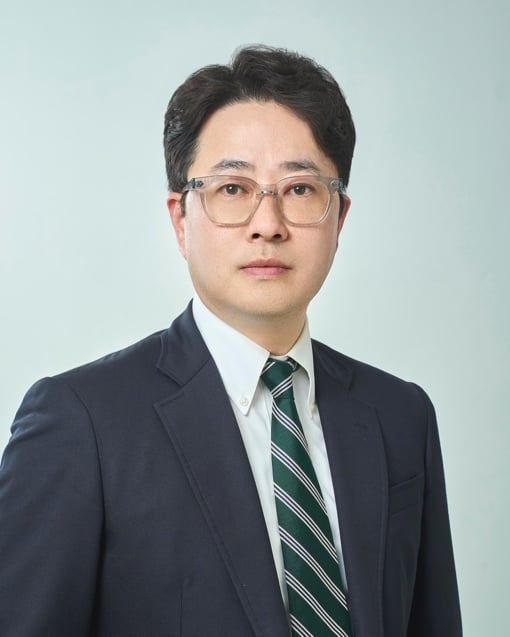
Claude Seo (MDPI Korea Office Manager, Seoul)
Claude Seo, who has over 15 years of experience in the academic publishing industry, has been appointed as the Office Manager of the Seoul office. The launch of our Seoul office allows us to better support the Korean scientific community and to further promote the publication of OA journals in the region.
Reflecting on his role, Claude shared that he is:
“Delighted to have been entrusted with this position within MDPI, the no. 1 scholarly OA publisher. As we establish our presence in Korea, we are dedicated to integrating ourselves into the local community and contributing to its vibrant culture. Our commitment goes beyond business growth; it is about creating a more informed and innovative society by embracing and promoting diversity within the scientific community.”
Sungkyunkwan University Joins MDPI’s Institutional Open Access Program
Additionally, I am pleased to share that Sungkyunkwan University has joined MDPI’s Institutional Open Access Program (IOAP). This program offers free access to MDP’s online submission system for institutions and provides APC discounts to affiliated authors. Thirteen major Korean universities, including Sungkyunkwan University, Kyunghee University, Chung-Ang University, and the Catholic University of Korea, have adopted IOAP in Korea.
Learn more about MDPI’s collaboration in Korea in my previous CEO Letter, in which I recap our visit to Seoul, South Korea.
Coming Together for Science
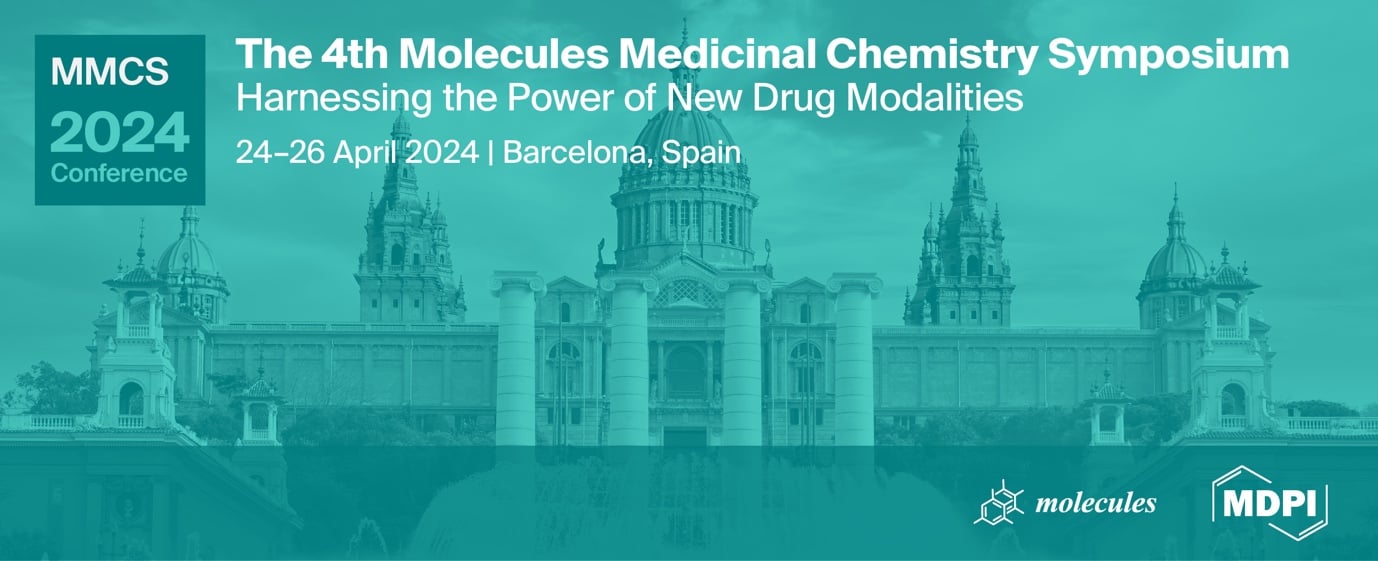
4th MMCS: Harnessing the Power of New Drug Modalities
Our conference team successfully managed the 4th Molecules Medicinal Chemistry Symposium, held from 24–26 April in Barcelona, Spain. It was chaired by Prof. Dr. Diego Muñoz-Torrero from the Institute of Biomedicine (IBUB), University of Barcelona, Spain, and Prof. Dr. Simona Collina from the University of Pavia, Italy. In total, there were 84 accepted abstracts and 102 conference attendees from 22 different countries.
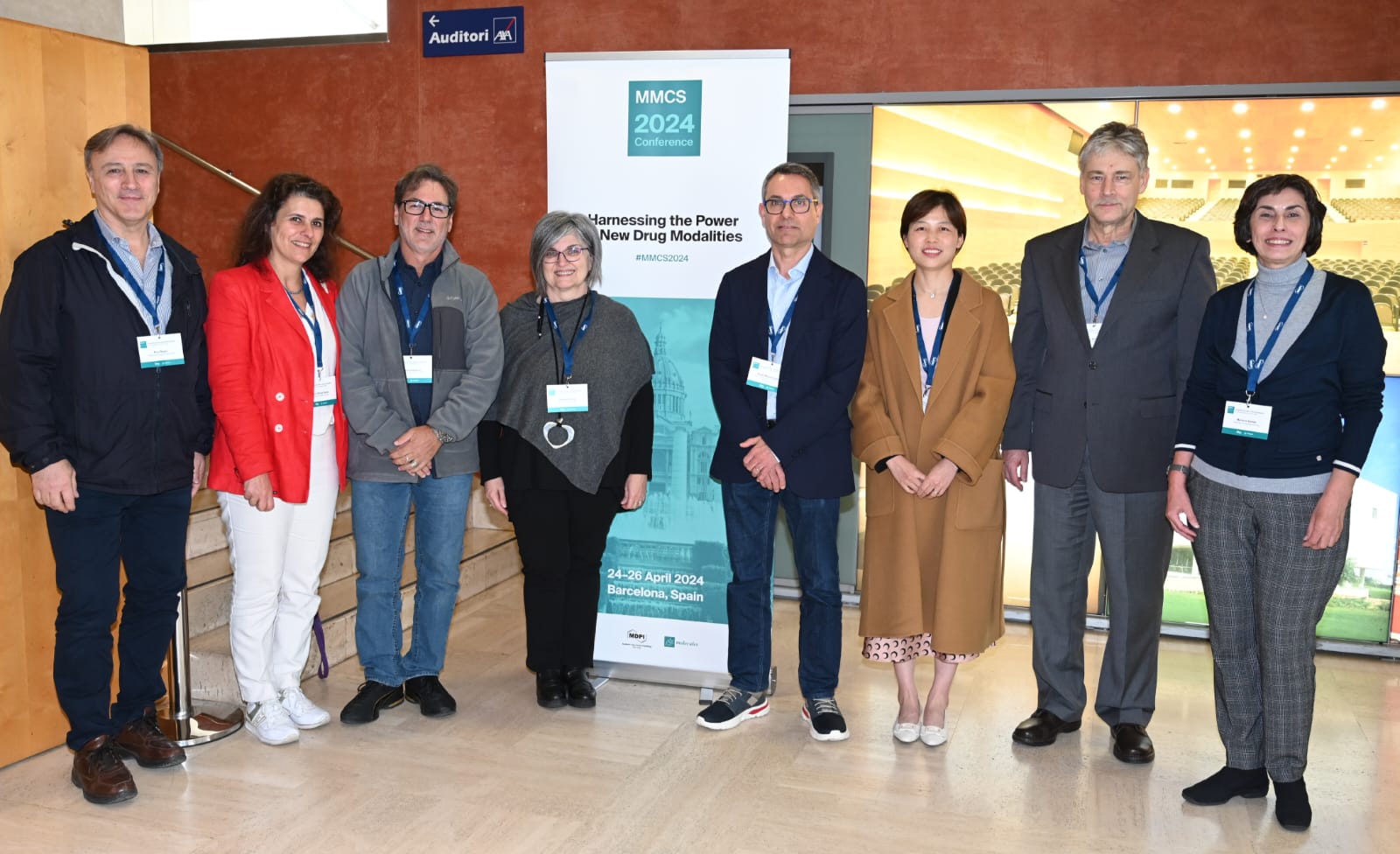
From left to right: Prof. Dr. Rino Ragno (Scientific Committee), Dr. Maria Emilia Sousa (Scientific Committee), Prof. Dr. Claudio Viegas Jr. (Scientific Committee), Prof. Dr. Simona Collina (Chair), Prof. Dr. Diego Muñoz-Torrero (Chair), Alvina Wu (Managing Editor, MDPI), Prof. Dr. Roman Dembinski (Scientific Committee), Prof. Dr. Mariana Spetea (Scientific Committee).
The event comprised 12 Invited Speakers, 35 Selected Talks, 10 Flash Poster Presentations, and 39 Posters. The overarching topic of the conference was the impact of the emergence of new drug modalities on drug discovery, with thematic sessions covering topics such as photoactivatable drugs, candidates targeting RNA and epigenetic targets, covalent modifiers, and the development of new anti-cancer agents, among other medicinal chemistry projects.
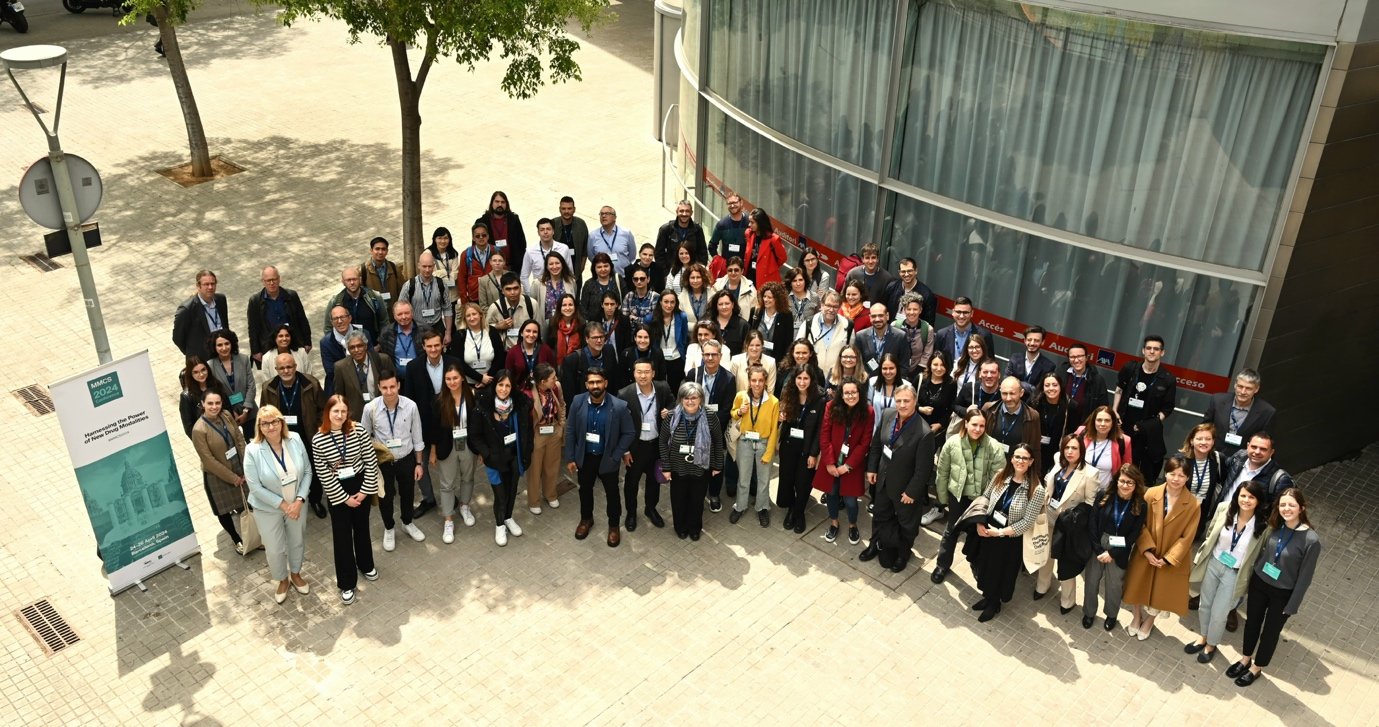
We are pleased to have received feedback from attendees highlighting the professional approach of the conference chairs and participants, the high quality of the talks, and the overall outstanding organization on the part of the MDPI conference team.
Thank you to the conference sponsors, Fluorochem and IBUB, and to our partnering societies, The Spanish Society for Biochemistry and Molecular Biology (SEBBM), and the Spanish Society of Medicinal Chemistry (SEQT).
Upcoming In-Person Event
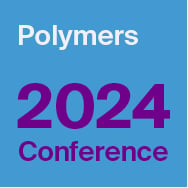
28–31 May, 2024
Polymers 2024 – Polymers for a Safe and Sustainable Future
Location: Athens, Greece
Conference Chairs: Prof. Dr. Dimitrios Bikiaris, Prof. Dr. Konstantinos Triantafyllidis, Dr. Ioanna Deligkiozi
We look forward to welcoming experts Prof. Damià Barceló, Prof. Minna Hakkareinen, and Prof. Armando J. D. Silvestre to this event.
Find more upcoming MDPI events here.
Organize Your Event with MDPI’s Sciforum
Sciforum is MDPI’s platform dedicated to the organization of scientific events. In line with our mission to promote science, Sciforum supports scholars, societies, research networks, and universities at all stages of organizing in-person events, virtual events and webinars. Our platforms are efficient, user-friendly, and cost-effective. We handle all steps related to event management. Contact us for details.
Closing Thoughts
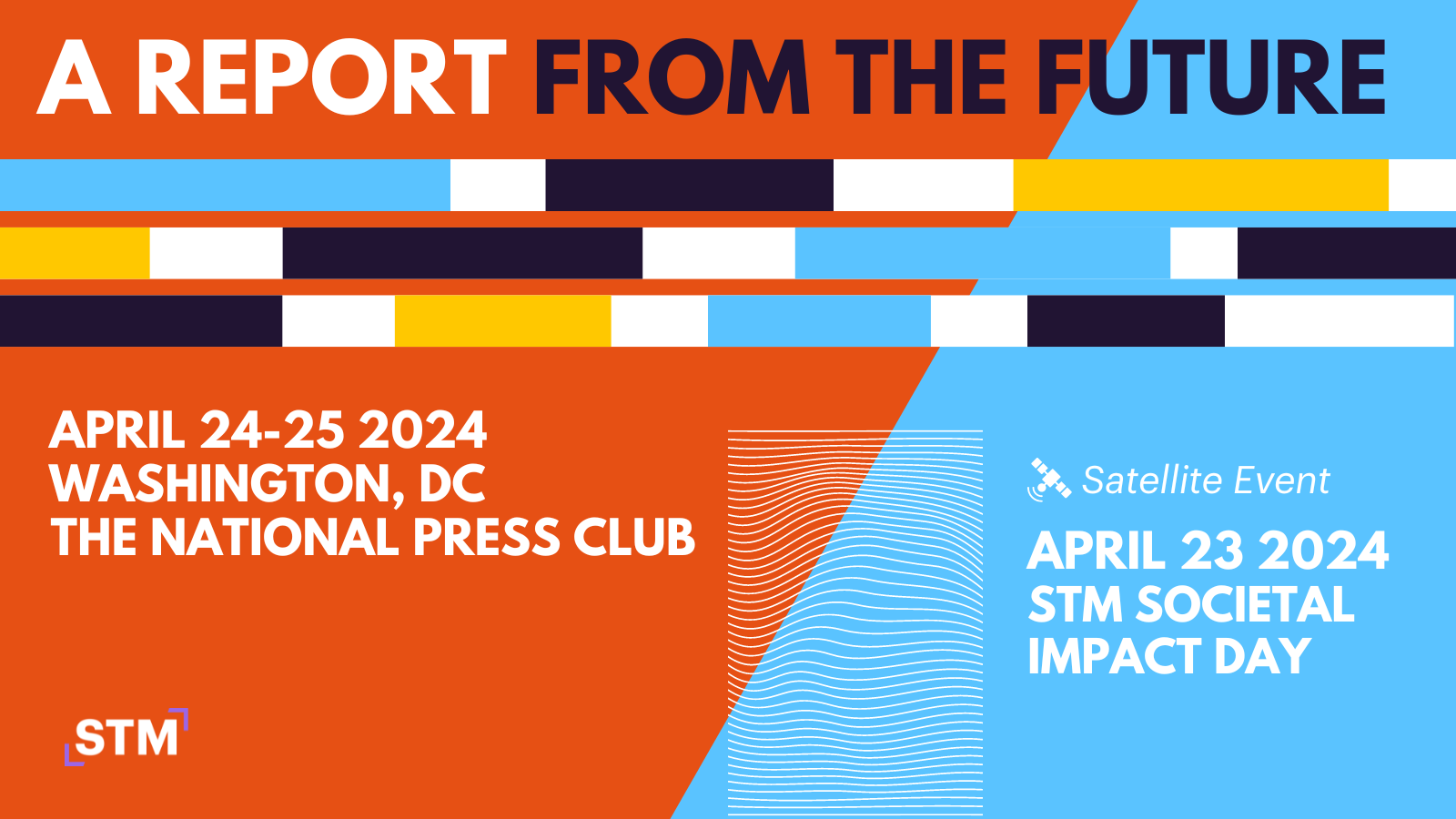
A Report from the Future – STM US Annual Conference 2024
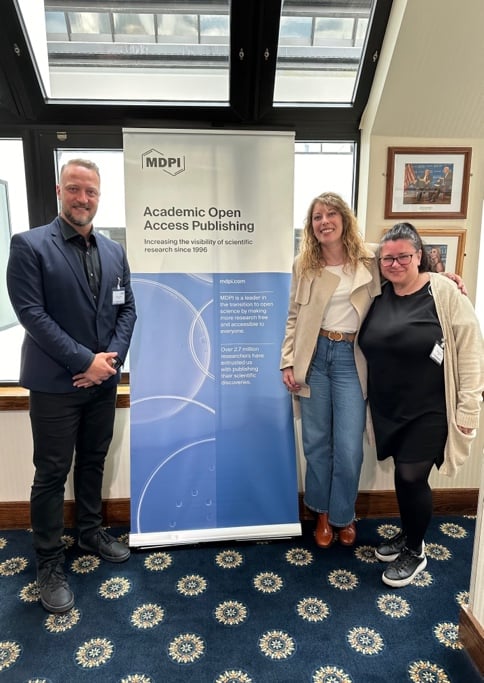
Stefan Tochev (CEO, MDPI), Dr. Giulia Stefenelli and Dr. Ioana Craciun from MDPI’s Scientific Office Board.
MDPI has for a long time been a sponsor of the STM Annual Conferences, held yearly in the US and Frankfurt, and is a trusted partner and supporter of the STM organization. While I have attended the Frankfurt conference for the past three years, this was my first time visiting the Washington, DC session, and I am glad I did.
Although it was a brief trip, I greatly appreciated the opportunity to attend in the company of my colleagues Dr. Giulia Stefenelli and Dr. Ioana Craciun from MDPI’s Scientific Office Board. They always help map some of the new industry trends against MDPI’s operational framework and guidelines. It’s a great group for kicking ideas back and forth on what we can apply at MDPI.
In my experience, STM never fails to deliver. It’s always a great conference for reconnecting with fellow publishers, industry friends, and vendors. As usual, STM this year curated a diverse range of speakers and panels, who proferred valuable knowledge and insights from outside our industry, delivering thought-provoking insights into our field. An example of this was the ‘Trust Panel’ session, which included Alan Schiffres (Managing Director, InfoLinx), who shared a number of the learnings about fraud and risk management from his 40 years in financial services, to help address some of the challenges we are currently facing in the area of publishing integrity.
Launch of STM Trends 2028 Panel
I particularly enjoyed the ‘Launch of STM Trends 2028 Panel’, which presented a report focused on the integration of humans and machines in scholarly publishing. The session highlighted themes such as AI, digitization, and the evolving research ecosystem. The report envisions a future where technology blurs the lines between human and machine involvement in research processes, with significant implications for trust, reputation, and equity. While this presents opportunities for connectivity and knowledge dissemination, it also poses challenges such as disinformation, fragmentation, and geopolitical tensions. We must rely on a wise combination of technology and human agency to navigate this complex landscape and will have to carefully examine its potential impacts on communication and scholarly publishing.
MDPI has joined the STM Integrity Hub. Click here to learn more.
While every presenter brought their own knowledge and personal touch, I was particularly pleased to encounter new speakers such as Heather Whitney (Research Assistant Professor, Radiology, University of Chicago) and Igor Grossmann (Professor of Psychology, University of Waterloo, Canada). Having studied Sociology at the University of Guelph, I have a soft spot for fellow social scientists from Canada, and I was very impressed by Igor’s presentation on ‘The Social Scientist: A View from the Future’ and his participation in the panel session ‘The Future Beyond the Article,’ which was one of my favourites from the conference, given the diversity of perspectives from the panel speakers.
Memorial Park in Washington, DC

On a personal note, this was my first-time visiting Washington, DC, and I’m glad we took an afternoon to visit the Memorial Park, with its incredible monuments to figures ranging from Martin Luther King, Jr. to Abraham Lincoln. The magnitude of the monuments is deeply impressive. I particularly appreciated the Thomas Jefferson memorial and the following quote, which I think speaks to the importance of change and adaptation. It’s something we can apply not only in our industry but also in our personal lives.
"I am not an advocate for frequent changes in laws and constitutions, but laws and institutions must go hand in hand with the progress of the human mind. As that becomes more developed, more enlightened, as new discoveries are made, new truths discovered and manners and opinions change, with the change of circumstances, institutions must advance also to keep pace with the times. We might as well require a man to wear still the coat which fitted him when a boy as a civilized society to remain ever under the regimen of their barbarous ancestors."
– Excerpted from a letter to Samuel Kercheval, July 12, 1816.
Chief Executive Officer
MDPI AG
30 April 2024
MDPI Opens Office in Seoul, Korea and Appoints Claude Seo as Office Manager
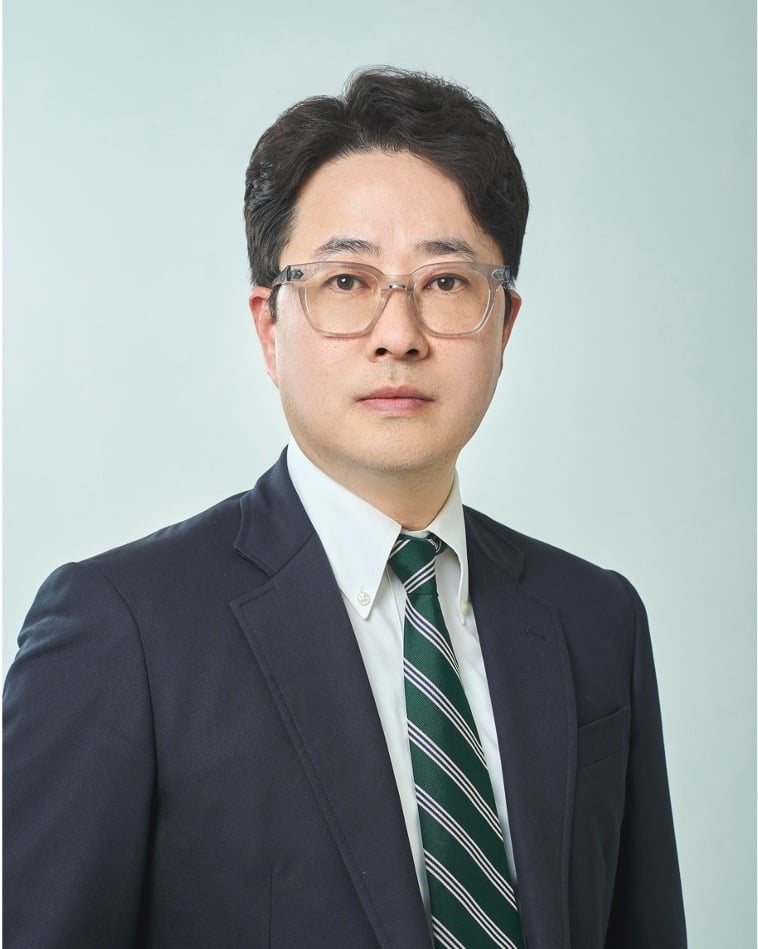
MDPI, the leading Open Access (OA) publisher, announced on Monday that it opened its Korean branch office on 29th April 2024. With this addition, MDPI now operates 21 offices in 12 countries worldwide. Claude Seo, with over 20 years of experience in the academic journal publishing industry, including Nature Publishing Group (NPG), has been appointed as the Office Manager of the Seoul office.
With the establishment of a Seoul office, MDPI aims to actively support Korea scientific communities to further promote the publication of OA journals in the region. As of the end of 2023, Korea ranked sixth worldwide in both submissions and publications of MDPI research papers. MDPI is the number one OA publisher in Korea.
Sungkyunkwan University Joins MDPI’s Institutional Open Access Program
In addition, MDPI announced that Sungkyunkwan University joined MDPI’s Institutional Open Access Program (IOAP). This program offers free access to MDPI online submission system for the institutions and APC discounts to affiliated authors. Thirteen major Korean universities, including Sungkyunkwan University, Kyung Hee University, Chung-Ang University and Catholic University of Korea, have adopted IOAP in Korea.
OA aims to break down barriers that have traditionally restricted access to science, ensuring that knowledge is available to all, regardless of financial situation or institutional affiliations. Authors, academia, and scientific communities are rapidly moving toward OA. MDPI has been at the forefront of reshaping the academic publishing landscape, with OA surpassing subscription-based publishing in 2020.
MDPI CEO Visits Seoul, Korea
In March, Stefan Tochev, Chief Executive Officer (CEO) of MDPI, visited Korea and met with various stakeholders including government agencies, research and academic institutions, universities. During his visit, Stefan highlighted that MDPI continues to pave the way for a world where science is accessible to all, supporting a global community of inclusive innovation and collaborative solutions.
Stefan expressed excitement about the new venture, stating, "Today marks a significant milestone for MDPI as we celebrate the opening of our new office in Seoul, Korea. This expansion is more than just an increase in our physical footprint, it is a pivotal step in our ongoing commitment to making scientific knowledge more accessible, participatory, and inclusive across the globe."
Claude Seo, reflecting on his new role, commented, "I am delighted to have been offered this position of trust within MDPI, the no. 1 scholarly OA publisher. As we establish our presence in Korea, we are dedicated to integrating into the local community and contributing to its vibrant culture. Our commitment goes beyond business growth; it is about creating a more informed and innovative society by embracing and promoting diversity within the scientific community.”
For further inquiries, please contact our Seoul office directly.
About MDPI
A pioneer in scholarly, open access publishing, MDPI has supported academic communities since 1996. MDPI is leading the transition to open science by making more research free and accessible to everyone. Over 3.3 million researchers have entrusted MDPI with publishing their scientific discoveries. MDPI’s editorial process is bolstered by a network of dedicated reviewers, a team of 6000 diligent, well-trained staff members, and an in-house article submission platform that was designed to ensure efficient processes within its 430 fully OA titles.
28 April 2024
Actuators | Interview with Prof. Dr. Luigi De Luca, Member of the Committee of the 2nd International Electronic Conference on Actuator Technology

1. Could you introduce your current research direction and provide an update on your progress?
I am a professor of aerospace engineering and am active in the fluid mechanics field. My interest in the topic of actuators is related to the area of flow control, which is a current research line from both scientific and industrial viewpoints. I worked on the design, development and application of devices that are generally referred to as synthetic jets, which are used to manipulate and change the properties of fluid flows. An interesting new direction of this research is its application to two-phase flows, like liquid jets issuing into a gaseous ambient to produce atomization. This research will be carried out experimentally and numerically.
2. Can you share any experiences of overcoming challenges that you have faced in your research?
Surely, I encountered many difficulties and challenges; in the research field, when a problem is solved, it often appears trivial, and one has to move towards more difficult and challenging new goals.
I overcame the difficulties by studying, reading similar papers in the literature, exchanging information with colleagues, and participating in conferences. Of course, in the end, one’s intuition is a base requisite.
3. What do you believe the hot topics in the field of fluid mechanics research will be over the next few years, and why do you think these subjects will become important?
Fluid mechanics problems involve physical situations where many variables change rapidly in space and time; hence, to predict flow behavior, it is mandatory to work with reduced-order models to capture the essence of the physics with a relatively simple model. This need constitutes a modern research line, named reduced-order modeling, or modal decomposition analysis. Also, so-called data-driven models are a modern topic which can be used to reduce the complexity of the problem, drawing information from previous (numerical or experimental) knowledge or data.
4. With numerous conferences being organized each year, do you have any suggestions that might make our conference more meaningful for scholars and students?
Maybe the organization of mini-symposia on specific restricted topics could help potential participants recognize how to benefit from participation in the conference.
5. What are your thoughts on the current trends and developments of open access publishing?
Open access publishing speeds up the diffusion of information and new results. Also, the reduced time of revision of manuscripts is an important parameter. In my opinion, sometimes the costs are too high, especially for young independent researchers.
28 April 2024
Actuators | Interview with Prof. Dr. José Luis Sánchez-Rojas, the Session Chair of the 2nd International Electronic Conference on Actuator Technology

1. Could you introduce your current research direction and provide an update on your progress?
My research is at the forefront of technological innovation, integrating piezoelectric sensors and actuators with cutting-edge MEMS and 3D-printing technologies. This multidisciplinary approach enables the development of sophisticated devices for a variety of applications, such as real-time liquid monitoring, efficient fluid pumping, and the advancement of micro-robotics and ultrasonic motors. The potential impact of this work is significant, offering advancements in precision, automation, and miniaturization in critical fields.
2. Have you encountered any challenges in your research?
In the realm of scientific investigation, we are perpetually confronted with a myriad of challenges. These encompass a broad spectrum, ranging from technical difficulties, the necessity for design enhancements, and the exploration of novel materials to the demands of our applications, among others.
Moreover, we grapple with substantial obstacles that are inherently tied to the constraints of physics. A case in point is the miniaturization of actuators, a task that becomes increasingly complex as the performance variables of interest inversely scale with volume or area. This scenario presents formidable challenges to both our creative capacities and the technologies at our disposal.
3. Could you share your experience of overcoming these issues?
Minor obstacles are surmounted through relentless diligence and perseverance, fortuitously culminating in the genesis of new scholarly publications and projects. More substantial challenges and innovative ideas persistently linger, serving as a source of inspiration for the research collective, particularly for nascent doctoral candidates. These challenges are not merely hurdles to overcome, but catalysts that drive our pursuit of knowledge and innovation.
4. What do you believe the hot topics in the field of miniature actuators research will be over the next few years, and why do you think these subjects will become important?
Based on recent trends and advancements, here are some potential hot topics in the field of miniature actuators research:
- Material research: The development of new materials such as polymers, organic materials, piezoelectric materials, nitrides, shape memory alloys, thermoelectric materials, and other functional thin-film materials. These materials can significantly enhance the performance of miniature actuators;
- Fabrication technologies: Innovative processes and fabrication technologies for miniaturized actuator systems are expected to be a major focus. This includes deposition techniques, lithography, etching and ablation techniques, hybrid technologies, and three-dimensional (3D) printing;
- Functional surfaces: The creation of functional surfaces in actuator microdevices, such as hydrophobic/hydrophilic functionalization, tribological functions, and biomimetic surfaces;
- Modeling and simulation: As the complexity of these systems increases, so does the need for more sophisticated modeling and simulation tools. This includes CAD tools and simulations, from the packaged systems down to the device level;
- Actuation principles: Research into various physical actuation principles, such as electrostatic, piezoelectric, mechanical, thermal, acoustic, and magnetic, will continue to be important;
- Bioactuators and artificial muscles: The development of chemical actuators and bioactuators, as well as artificial muscles, is a promising area of research;
- System integration: The integration of miniature actuators into larger systems, including interface electronics, packaging and assembly, 3D integration techniques, micro-mechatronics, and micro-robotics, will be crucial;
- Applications and markets: The exploration of new applications and markets for miniaturized actuators/micro-actuators, including monitoring, control, and measurement systems, will be a key area of focus.
These topics are driven by the increasing demand for smaller, more efficient, and more capable devices in a variety of fields, including robotics, biotechnology, and the Internet of Things (IoT). The miniaturization of robots with locomotion abilities is a challenge with a significant technological impact in many applications where large-scale robots have physical or cost restrictions.
5. As the session chair of IECAT2024, what kind of meeting you are looking forward to in particular?
In general, I am looking forward to gaining knowledge about the latest research and learning about the latest findings and methods in the field of actuators before they are even published in the journal.
Networking is also important for research teams, and a conference is a good opportunity to meet experts and like-minded individuals in our field, which can lead to collaborations and partnerships.
Interdisciplinary learning approaches, bringing together researchers from different areas, will clearly be a part of IECAT. Regarding career development, attending conferences can lead to learning about career-changing prospects and forging strong working relationships.
6. With numerous conferences being organized each year, do you have any suggestions that would make our conference more meaningful for scholars and students?
In order to enhance the value and impact of our conference, it would be beneficial to incorporate tutorials and webinars into our program. These sessions, led by esteemed researchers, could offer insights and nuances of their work that are typically not included in published papers. Additionally, scheduling an in-person gathering every two years could significantly increase the benefits of the conference, fostering stronger connections and collaborations among attendees. This hybrid model could provide a more comprehensive and enriching experience for all participants.
In addition, speaker incentives may also motivate submissions. Currently, the conference will provide six awards, including Best Oral Presentation Award and Best Poster Award. I would also like to propose waiving the Article Processing Charges (APCs) for keynote speakers and offering a greater discount than the currently announced 20% for invited speakers. As a nascent conference, I believe this would be a beneficial investment that could aid in its promotion.
25 April 2024
Actuators | Interview with Prof. Dr. Kenji Uchino, the Chair of the 2nd International Electronic Conference on Actuator Technology
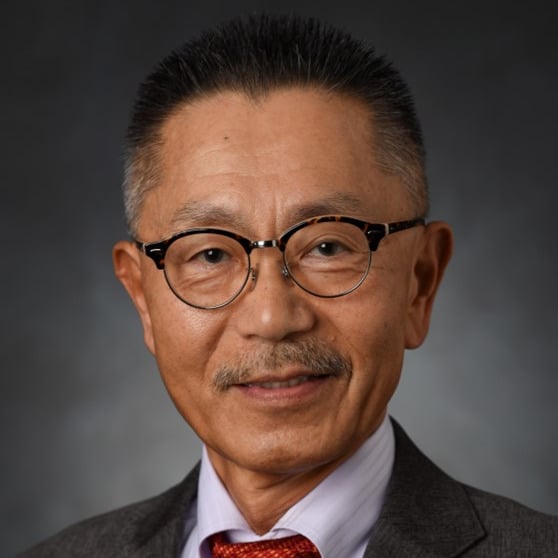
1. Could you introduce your current research direction and provide an update on your progress?
I stepped down from my administrative position and then stopped academic research at the end of 2021. Thus, I will introduce here my previous activities. I am one of the pioneers of piezoelectric actuators, and currently an Academy Professor at Emeritus Academy Institute, the Founding Director of the International Center for Actuators and Transducers, Materials Research Institute, and I was a Professor of EE and MatSE, Distinguished Honors Faculty of Schreyer Honors College at The Pennsylvania State University, USA. I was an Associate Director (the US Navy Ambassador to Japan) at the US Office of Naval Research—Global Tokyo Office from 2010 to 2014. I was also the Founder, Senior Vice President, and CTO of Micromechatronics Inc., State College, PA, from 2004 to 2010. I have been a University Professor for 48 years, a Company Executive (President or Vice President) for 21 years, and a Government Officer for 7 years in both Japan and the US. I am the discoverer/inventor of the following famous topics: (1) lead magnesium niobate (PMN)-based electrostrictive materials, (2) cofired multilayer piezoelectric actuators (MLA), (3) superior piezoelectricity in relaxor–lead titanate-based piezoelectric single crystals (PZN-PT), (4) photostrictive phenomena, (5) shape memory ceramics, (6) magnetoelectric composite sensors, (7) transient response control scheme of piezoelectric actuators (pulse drive technique), (8) micro ultrasonic motors, (9) multilayer disk piezoelectric transformers, and (10) piezoelectric loss characterization methodology. My recent research and commercialization focuses are primarily on items (8) – (10).
2. Can you share any experiences of overcoming challenges that you have faced in your research?
I have made a breakthrough that could lead to photophones—devices without electrical connections that convert light energy directly into sound. Perhaps this discovery will help commercialize optical telephone networks. It could also allow robots to respond directly to light, again, without the need for wire connectors. This discovery is occasionally used to teach students about entrepreneurship.
Where did I come up with the idea for this light conversion? Not with the sunlight shining through my office window and not outside feeling the warmth of the sun, but I came up with the idea in a dimly lit karaoke bar. I was working on ceramic actuators—a kind of transducer that converts electrical energy to mechanical energy—at the Tokyo Institute of Technology when the trigger for “the light-controlled actuator” was initiated. In 1980, one of my friends, a precision-machine expert, and I were drinking together at a karaoke bar, where many Japanese people go, to enjoy drinks and our own singing. We called this activity our “after-5-o'clock meeting” in the pre-Twitter or Facebook period. At that time, my friend studied micro-mechanisms such as millimeter-sized walking robots. He explained that, as electrically controlled walking mechanisms become very small (on the order of a millimeter), they do not walk smoothly because the frictional force drops drastically, and the weight of the electric lead becomes more significant.
After a few drinks, it becomes easier to play “What if?” games. That is when he asked, “What if you, an expert on actuators, could produce a remote-controlled actuator? One that would bypass the electrical lead?” To many people, “remote control” equals controlled by radio waves, light waves, or sound. Light-controlled actuators require that light energy be transduced twice: First from light energy to electrical energy, and second from electrical energy to mechanical energy. These are “photovoltaic” and “piezoelectric” effects.
A solar cell is a well-known photovoltaic device, but it does not generate sufficient voltage to drive a piezoelectric device. So, my friend’s actuator needed another way to achieve a photovoltaic effect. Along with the drinking and singing, we enjoyed these intellectual challenges. I must have had a bit too much that night since I promised I would make such a machine for him. But I had no idea how to do it! While my work is applied research, I usually come home from scientific meetings about basic research with all kinds of ideas. At one of these meetings, about six months after my promise, a Russian physicist reported that a single crystal of lithium niobate produced a high electromotive force (10 kV/mm) under purple light. His talk got me excited. Could this material make the power supply for the piezoelectric actuator? Could it directly produce a mechanical force under purple light?
I returned to the lab and placed a small lithium niobate plate onto a plate of piezoelectric lead zirconate titanate. Then, I turned on the purple light and watched for the piezoelectric effect (mechanical deformation). But it was too slow, taking an hour for the voltage to get high enough to make a discernable shape change. Then, the idea hit me: what about making a single material that could be used for the sensor and the actuator? Could I place the photovoltaic and piezoelectric effects into a single asymmetric crystal? After lots of trial and error, I came up with a tungstate-doped material made of lead lanthanum zirconate titanate (PLZT) that responded well to purple light. It had a large piezoelectric effect and had properties that would make it relatively easy to fabricate.
To make a device out of this material, I pasted two PLZT plates back-to-back, but placed them in opposite polarization, and then connected the edges. I shined a purple light to one side, which generated a photovoltaic voltage of 7 kV across the length. This caused the PLZT plate on that side to expand by nearly 0.1% of its length, while the plate on the other (unlit) side contracted due to the piezoelectric effect through the photovoltage. The whole device bent away from the light. For this 20 mm long, 0.4 mm thick bi-plate, the displacement at the edge was 150 µm, and the response speed was 1 second. This fast and significant response was pretty exciting.
Remembering the promise to my friend, I fabricated a simple “light-driven micro walking machine,” with two bi-plate legs attached to a plastic board. When the light alternately irradiated each leg, the legs bent one at a time, and the machine moved like an inchworm. It moved without electric leads or circuits! That was in 1987, seven years after my promise.
I got busy with my “toy”, but not too busy to attend the “after-5-o’clock meetings” in Tokyo’s nightclub area. In 1989, at my favorite karaoke bar, I was talking about my device to another friend who worked for a telephone company. He wanted to know if the material could make a photo-acoustic device—perhaps as a solution to a major barrier in fiber-optic communication. The technology to transmit voice data—a phone call—at the speed of light through lasers and fiber optics had been advancing rapidly. But the end of the line—the ear speaker—limited the technology, since optical phone signals must be converted from light energy to mechanical movement via electrical energy.
I thought my material could convert light flashes directly into sound. I chopped two light beams to make a 180-degree phase difference and applied each beam to one side of the bi-plate. The resonance point, monitored by the tip displacement, was 75 Hz, just at the edge of the audible range for people! We’re now working to fabricate real photo-speakers (I call them “photophones”) and have ideas that may increase the vibration frequency several-fold to reproduce human speech correctly. Photophones could provide a breakthrough in optical communication.
Well, what is my message for you, dear reader? To find a noisy karaoke bar? Perhaps that is not necessary, but what is necessary is listening to others outside of your particular research area, for instance, basic researchers or people with specific, applied objectives.
3. What do you believe the hot topics in the field of piezoelectric actuator research will be over the next few years, and why do you think these subjects will become important?
Innovative materials and drive/control developments have not been seen in the past two decades, except for performance improvements. Thus, new application developments should be focused, aiming at million-selling products. The author comments on the paradigm shift from “econo-engineering” to politico-engineering in science and technology development. In the 1980s, i.e., the “Bubble Economy” period, cost/performance technologies were sought that fitted the governmental slogan, “lighter, thinner, shorter, smaller (軽薄短小)”, while, in the 2000s, sustainability and crisis technologies should be mainstream, alongside the slogan “cooperation, protection, reduction, continuation (協守減維)”. These trendy technologies are primarily initiated by political regulations.
The crises include the following:
(1) Natural disasters;
(2) Infectious/contagious diseases;
(3) Enormous accidents;
(4) Intentional terrorist/criminal incident;
(5) External and civil war/territorial invasion.
To the contrary, sustainability technologies were introduced in the following piezoelectric device areas, including medical applications:
(a) Non-toxic Pb-free piezo-materials;
(b) Ultrasonic disposal technology for hazardous materials;
(c) Reduction of contamination gas with piezo-devices;
(d) New energy source creation (i.e., piezoelectric energy harvesting);
(e) Energy-efficient piezoelectric device development;
(f) Medical acoustic probes and micro-disruptors for medical catheters.
I propose a new four-Chinese-character slogan for the era of “politico-engineering”, “協, 守, 減, 維 (cooperation, protection, reduction, and continuation)”. The standardization of internet systems and computer cables requires global “cooperation” and coordination to accelerate mutual communication. The “Paris Agreement” in 2016 is an international agreement on “Greenhouse Gas” regulation linked to the United Nations Framework Convention on Climate Change. “Protection” is mandatory for the territory and environment from the enemy or natural disaster and from pandemic disease spread. A “reduction” in toxic materials and energy consumption should be urged, then society’s “continuation” (or a sustainable society), in parallel with medical technology advancements, will be the ultimate desire. This development strategy is the key for the new generation of researchers.
4. As the conference chair, could you briefly describe what kind of meeting you are looking forward to in particular?
Let me explain the so-called “Google Syndrome”. The search engine Google went online in 1998. After this event, research approaches changed significantly. When I encourage them to research something new, most of my current Ph.D. graduate students take the following research steps: (1) search the recent research papers on the indicated topics on the Google search engine, (2) summarize the results, picking up the unstudied parts by believing that the already-published results are correct, and (3) set a research plan for himself/herself. Most recently, even the research plan/proposal is generated with ChatGPT. This “addiction” was named “Google Syndrome”. The important point is the fact that no completely new idea comes out because Google and ChatGPT can only generate the combined idea of already-published materials. I encourage young researchers to find a very innovative and unique idea, which the present Google does not include. Therefore, I am expecting this sort of unique paper, which does not include other groups’ paper citations.
5. With numerous conferences being organized each year, do you have any suggestions that might make our conference more meaningful for scholars and students?
Most of the current MDPI Actuators papers focus on performance improvement. In the drive/control area, for example, complicated mixed systems (including neuro networks) are reported, which I would say is “Spaghetti Syndrome”. I sincerely hope to collect very innovative and unique ideas for our conference, which present Google searches may not include.
6. Could you share some of your past conference experiences? Did these conferences assist you in promoting your research results, expanding your network, finding potential collaborators, advancing your career, etc.?
The International Conferences on Actuators and Transducers organized by the Penn State International Center for Actuators and Transducers were organized in that direction: (1) Only the eminent worldwide researchers were invited (a small number attendance less than 50), with both academic and industry researchers in a 50-50 ratio. (2) The invitees were selected from various fields, including physics, chemistry, ceramics, electrical, mechanical, computer engineering, etc. (3) By putting a long discussion time between each presentation, we encouraged researchers to find their future collaborators. (4) Students could demonstrate their capabilities to companies that they could join in the future.
7. What are your thoughts on the current trends and development of open access publishing?
Open access publication is good for disclosing a scientific idea quickly. Personally, considering intellectual property, I usually finish the patent and other IP applications first, followed by the report to the Research Contract Agencies. The publication, especially for open access, will be delayed typically by 4–5 years, after finishing all processes for commercialization.
3 April 2024
Meet Us at the 8th National Congress of Magnetic Materials and Devices, 12–14 April 2024, Hangzhou, China

Conference: 8th National Congress of Magnetic Materials and Devices
Date: 12–14 April 2024
Location: Hangzhou, China
MDPI will attend the 8th National Congress of Magnetic Materials and Devices as an exhibitor. We invite researchers from different backgrounds to visit and share their latest ideas with us.
The 8th National Congress of Magnetic Materials and Devices aims to gather domestic scientific and technological workers and industrial units to discuss the focus, hot spots, frontiers, and key common scientific issues in the field, share the latest results, explore basic research ideas and priority development directions, and promote technological progress and industrialization. Collaborate, grasp scientific research and industry development trends, and promote industry–university–research cooperation and leapfrog development.
The following MDPI journals will be represented:
If you are planning to attend this conference, please do not hesitate to start an online conversation with us. Our delegates look forward to meeting you in person and answering any questions you may have. For more information about the conference, please visit the following website: http://www.c-nmaterial.com.cn/index.php.



